

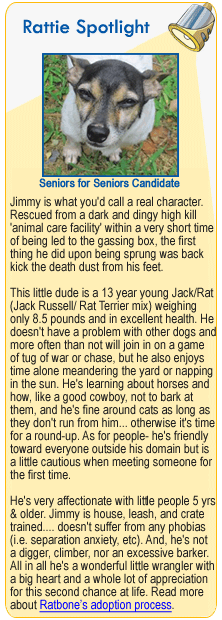

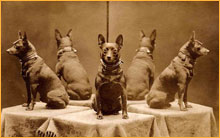
A well rounded breed - Rat Terriers

 |
||||||
 |
|
 |
||||
 |
||||||


 Volunteer - Click here
Volunteer - Click here
 About our adoption process
About our adoption process
 Visit RatboneRescues.com
Visit RatboneRescues.com


Physical vs. Mental Exercise for your Dog
Greetings!
I was speaking with a woman the other day about her dog. She said her dog just wouldn't settle down. She seemed to have an endless supply of energy even after running around all day. I asked if she was stimulating her dog's mind at all and she told me she didn't know.
This is an area where there is a parallel between dogs and people. If I have a mentally stimulating day where my brain really gets a workout I'm usually really tired and ready to just veg out, but if I don't have any mental stimulation I have much more energy at the end of the day. The same holds true with Rover.
Have you noticed that a physical workout energizes you? The physical conditioning builds more stamina. It's the same with dogs. There is a point where the exercise will tire them, but it takes a lot! Dogs can run and run for hours and still be ready for more, but ten to fifteen minutes of making them concentrate and THINK is exhausting and they'll be ready for a nap. Just as the physical exercise will give us and our dogs physical stamina, exercising the brain will build mental stamina and we want Rover thinking and concentrating don't we?
So, how can we exercise Rover's brain? Obedience training is one great way. Making Rover sit and stay, correcting his mistakes and praising him for the right behavior is a great way of stimulating his brain. He needs to think about what he's doing and he needs to concentrate. He doesn't want a correction. He wants to be praised, so he has to think about what he's doing.
A very slow walk making sure he is right next to you on a loose leash is another brain stimulating exercise. The slower you walk the more Rover has to think about what he's doing. We've seen, over and over again, very high energy dogs crash as soon as they come back from a very structured five to ten minute walk. A "power walk" will give them more energy, just as it does us.
Puzzles are great way to mentally stimulate Rover. Take one of his favorite treats, let him sniff it and then hide it and let him try to find it or tie it inside an old towel and make him figure out how to get it out. Buster Cubes are also great puzzles for dogs.
Scatter feeding is another great mental game. Rover will have to search for his supper. This is also a great idea if he has a tendency to wolf down his food. We've never met a dog who didn't love this game.
The more we exercise Rover's brain, the happier and calmer he'll be. He does need physical exercise, just as we do, but he also needs mental stimulation. Dogs who are bored are more likely get into trouble.
If Rover is digging or chewing inappropriate items or if he's running all over the house out of control, look at the mental side of the equation. A mentally stimulated dog is a tired dog and a tired dog is a calm dog. A calm dog is a happy dog and we all know about happy dogs; don't we?
Submitted by Terry Nickerson, Canine Behavior Therapist and owner of Bark Busters of Brevard. You can reach Terry at 1-977-500-BARK or visit her company's website at www.Barkbusters.com.

Ratbone Leaks
-12"x12" piece of blue and white, wispy iridized glass, $8
-Uroboros leaves & branches glass pack, $100
-20" Classic lamp base, $150
-One of a kind, handmade stained glass lamp, priceless.
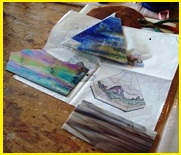 Heads up! We have something really special coming in the next few months. One of our members has started designing a special lamp which will be awarded to one lucky supporter of Ratbone Rescues. This will be the second Rat Terrier themed lamp designed and constructed by Susan Cadell, for Ratbone Rescues.
Heads up! We have something really special coming in the next few months. One of our members has started designing a special lamp which will be awarded to one lucky supporter of Ratbone Rescues. This will be the second Rat Terrier themed lamp designed and constructed by Susan Cadell, for Ratbone Rescues.
 The first lamp, pictured here, was a big hit and a beautiful work of art. We expect the second one to be just as lovely. Be sure to watch for future RatboneLeaks where we will update you on the progress of the lamp construction and let you know when it is ready to look for a new home. You don't want to miss this one.
The first lamp, pictured here, was a big hit and a beautiful work of art. We expect the second one to be just as lovely. Be sure to watch for future RatboneLeaks where we will update you on the progress of the lamp construction and let you know when it is ready to look for a new home. You don't want to miss this one.

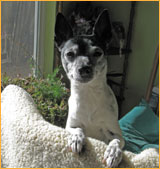 Little Ducky, one of the first Ratbone dogs, (Nov. 99) who I adopted, is now
13 years old and becoming quite spoiled and contrary in his old age. For
example, if he doesn't eat something in the morning, his tummy gets rumbly
then he won't eat in the evening. He has now learned that I am more
committed to him having breakfast than he is. So, he will refuse to take a
biscuit when the other dogs get theirs. He will sniff it then look away with
a pitiful "I just don't think I can handle that" look. In response, he has
trained me to go to the kitchen and fix him bread and milk for breakfast. In
fact if he is in a real mood, I will have to microwave it for 10 seconds
before serving.
Little Ducky, one of the first Ratbone dogs, (Nov. 99) who I adopted, is now
13 years old and becoming quite spoiled and contrary in his old age. For
example, if he doesn't eat something in the morning, his tummy gets rumbly
then he won't eat in the evening. He has now learned that I am more
committed to him having breakfast than he is. So, he will refuse to take a
biscuit when the other dogs get theirs. He will sniff it then look away with
a pitiful "I just don't think I can handle that" look. In response, he has
trained me to go to the kitchen and fix him bread and milk for breakfast. In
fact if he is in a real mood, I will have to microwave it for 10 seconds
before serving.
A couple years ago, I had to travel across the state to attend a mandatory, week long training. I fought this for 2 years, to no avail and I was finally forced to go. Three years earlier, I gave up going to my summer carving workshop because watching the dogs was becoming too much for my dad so it has been that long since Ducky had a significant separation from me. If I had gone visiting for a couple days, he was usually able to go along.
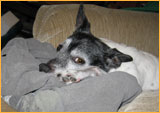 I explained all of Ducky's special eating needs to my dad before I left on
Monday morning. I also told him to let my personal dogs sleep in my room at
night since they are used to sleeping on my bed. I wanted to cause them as
little stress as possible. Ducky especially has always fretted when I was
gone. When I returned home the following Saturday evening, everyone jumped
around and barked excitedly. Ducky did his little Ratty bay at me. When my
dad told me how the week went however, he informed me that he didn't see a
reason to fix the bread and milk because Ducky ate very well all week and
took biscuits.
I explained all of Ducky's special eating needs to my dad before I left on
Monday morning. I also told him to let my personal dogs sleep in my room at
night since they are used to sleeping on my bed. I wanted to cause them as
little stress as possible. Ducky especially has always fretted when I was
gone. When I returned home the following Saturday evening, everyone jumped
around and barked excitedly. Ducky did his little Ratty bay at me. When my
dad told me how the week went however, he informed me that he didn't see a
reason to fix the bread and milk because Ducky ate very well all week and
took biscuits.
I was feeling worked. In addition, Ducky pouted or maybe was just punishing me. For the first four nights after I returned, he REFUSED to sleep on my bed. He would crawl in the dog bed on the floor under my bed but would not come up no matter how much I called or cajoled. If I physically picked him up to put him on the bed, he would growl at me and once on the bed, he would promptly get down and go back under the bed. On the fifth night, I put him on the bed and he crawled under the covers and stayed there. The next night, he put his feet on the bed, asking to be put up and once there went rooting to get under the covers. I guess he felt I had been adequately reprimanded for going off without him. Sometimes, I think I'm prone to anthropomorphism, I mean they are DOGS after all! Other times however, I really think they are just scary smart. It's no wonder we LOVE this breed!


At a year and a half, Finley, who reportedly had belonged to a "backyard breeder", was rescued from a high kill shelter in Georgia. Due to overcrowding, he moved from the foster home that pulled him to Laura, who kept him until he was adopted. Laura fell in love with Finley on sight. She saw his beautiful auburn spots and thought he looked like a little Irish man so she named him Finley, (Fair Warrior) which is what got him adopted. Carol Lux saw him on the website, loved his name and his look and off he went. The best part of the story for Laura was that when she took him to his new home, his new "mom" had beautiful light red hair. Then, when her son came down the stairs, he had beautiful AUBURN hair that matched Finley's exactly. It was awesome!
Carol had delightful things to say about Finley: In the 1.5 years or so since Fin became a part of my family he has made thousands of dog and people friends. (Really!) I have had dogs my whole life and there has never been any that touched my heart like he has. He goes everywhere with me, we are hardly ever apart. I work from home, teach yoga and work at a marina where "we" are stand up paddle board and kayak guides. Finley works at the camps for kids this summer he will be the official counselor/mascot of Summer Splash Camp at Jupiter Pointe Paddling. He teaches "Doggie Paddling", stand up paddle-boarding for dogs and their owners and is the official Jupiter Pointe Marina and Wylder's Restaurant mascot.
Wherever Finley goes, he owns the place. He has a huge fan club here in Jupiter. Everyone loves Finley and he loves to spend his time around people and other dogs. He is so smart and personable that I had at least 3 calls on Oscar night saying Fin is way smarter and cuter than that dog in the movie. My 87 year old mother loves him so much she drives 15 miles from home just to have him sit in her lap, lovingly adoring her. He has a spectacular life and I love him with all my heart.
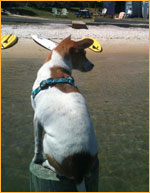 Wylder's, next to Jupiter Pointe Paddling, is where Fin likes to spend his non-work hours and break time, sitting on the bar at the restaurant, being hand fed mahi mahi, his favorite fish, or sitting on stage listening to the band. He especially like to sit on the drummer's or guitarist's lap. The waitresses carry him around like a baby. He is the mascot at my yoga classes and is the model for upward and downward dog, which he does on command (sometimes) and he also helps teach doggie yoga classes. And sometimes, the Fin Man likes to just sit atop a post at the end of the dock and survey his domain; I call it his "pelican" impersonation.
Wylder's, next to Jupiter Pointe Paddling, is where Fin likes to spend his non-work hours and break time, sitting on the bar at the restaurant, being hand fed mahi mahi, his favorite fish, or sitting on stage listening to the band. He especially like to sit on the drummer's or guitarist's lap. The waitresses carry him around like a baby. He is the mascot at my yoga classes and is the model for upward and downward dog, which he does on command (sometimes) and he also helps teach doggie yoga classes. And sometimes, the Fin Man likes to just sit atop a post at the end of the dock and survey his domain; I call it his "pelican" impersonation.
Finley will soon have his own Facebook page so all the tourists who've had their picture taken paddling with him, can keep track of his activities. From a stormy start to the gold at the end of the rainbow, Finley's story is truly a "Happy Tail". Hooray for Finley Lux!

Ratbone Rescues is a 501(c)(3) non-profit organization.
 I used to be someone's friend. I was loved and
taken care of. I slept in bed with my person, I had my own bowl and toys and
I could curl up on my person's lap and be petted. Then I ended up in a cage,
in a "shelter". It may be shelter, there is a bed, there is food and it is
not so cold as it was outside but it is not a home!
I used to be someone's friend. I was loved and
taken care of. I slept in bed with my person, I had my own bowl and toys and
I could curl up on my person's lap and be petted. Then I ended up in a cage,
in a "shelter". It may be shelter, there is a bed, there is food and it is
not so cold as it was outside but it is not a home!
 For Little Bill, things are looking up. He was rescued from the shelter by
Ratbone Rescues. He has been neutered and is being cared for and loved by a
foster mom until a new, loving family can be found for him. For Bill, there
is hope! For hundreds of thousands of others there is none! Every year, huge
numbers of dogs don't make it out of shelters because there is no place for
them to go. It was estimated that approximately 3.7 million animals were
euthanized in the nation's shelters in 2008. Only about 15 % of dogs that
enter animal shelters are reunited with their owners; another
25 % are adopted. This leaves nearly 60% of dogs that enter animal shelters
being euthanized.
For Little Bill, things are looking up. He was rescued from the shelter by
Ratbone Rescues. He has been neutered and is being cared for and loved by a
foster mom until a new, loving family can be found for him. For Bill, there
is hope! For hundreds of thousands of others there is none! Every year, huge
numbers of dogs don't make it out of shelters because there is no place for
them to go. It was estimated that approximately 3.7 million animals were
euthanized in the nation's shelters in 2008. Only about 15 % of dogs that
enter animal shelters are reunited with their owners; another
25 % are adopted. This leaves nearly 60% of dogs that enter animal shelters
being euthanized.
 Each one of you can help bring an end to the need for millions of animals
to be killed in shelters every year. Fewer pets born means fewer euthanized,
have your pet spayed or neutered. Adopt your next pet from a shelter or a
rescue. If you adopt from a rescue, a space is opened for another shelter
dog. Join a rescue, open your home to a foster animal or volunteer your time
and talent in other areas if you can't foster. Donate to rescue to help with
the cost of saving more lives. Help make a difference for others like Little
Bill.
Each one of you can help bring an end to the need for millions of animals
to be killed in shelters every year. Fewer pets born means fewer euthanized,
have your pet spayed or neutered. Adopt your next pet from a shelter or a
rescue. If you adopt from a rescue, a space is opened for another shelter
dog. Join a rescue, open your home to a foster animal or volunteer your time
and talent in other areas if you can't foster. Donate to rescue to help with
the cost of saving more lives. Help make a difference for others like Little
Bill.






